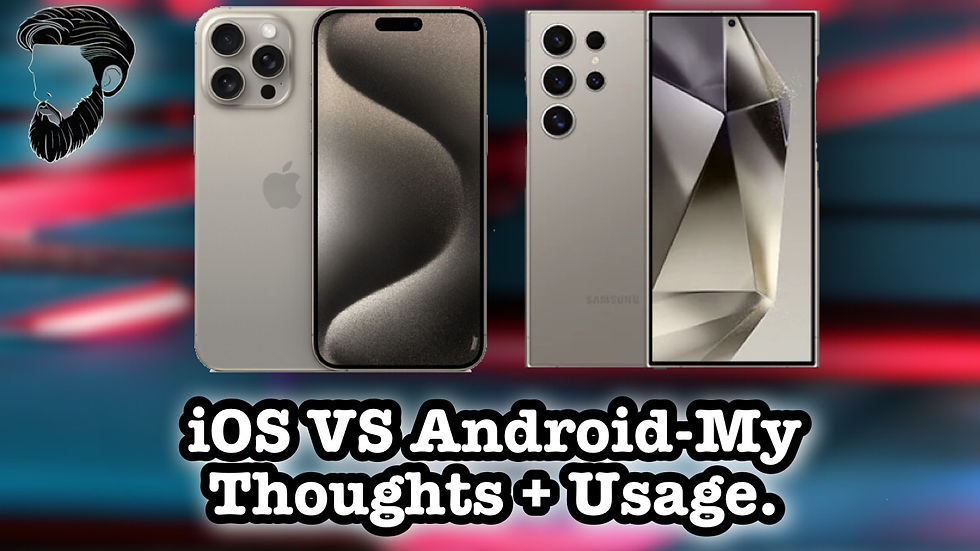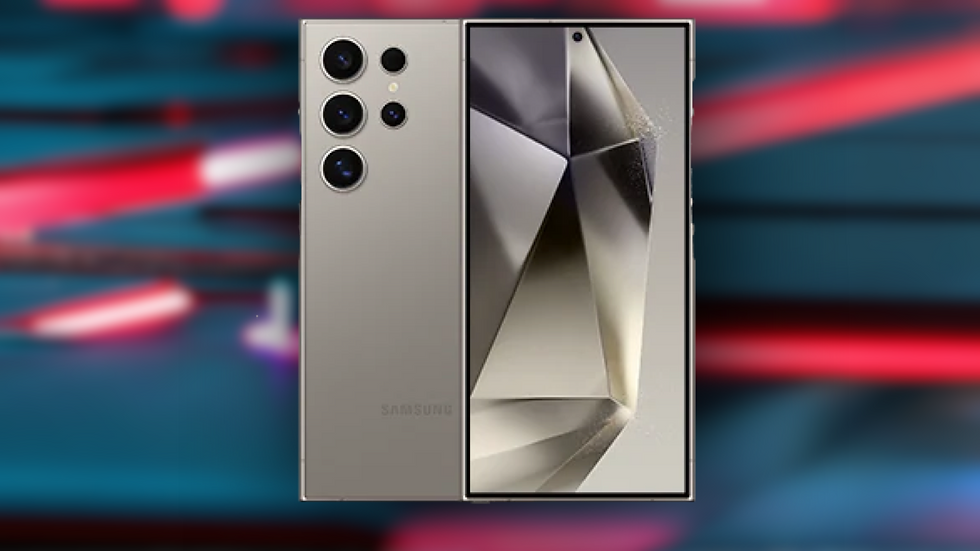iOS VS Android- My Thoughts and Usage:
- Jordan Cantelon

- Jun 18, 2024
- 5 min read

In the world of smartphones, the debate between iOS and Android continues to be a hot topic, especially when comparing flagship devices like the iPhone 15 Pro Max and the Samsung Galaxy S24 Ultra. Both devices represent the pinnacle of their respective ecosystems, offering top-notch hardware and software experiences.
This article will compare and contrast these two smartphones, highlighting the pros and cons of their software and hardware, and I'll also share how I use the previous versions of these two devices, the iPhone 14 Pro Max and Samsung S23 Ultra, which are very similar, but slightly older versions of Samsung and Apple's latest heavy hitters.
iPhone 15 Pro Max:

iPhone 15 Pro Max (USA Link) https://www.apple.com/shop/buy-iphone/iphone-15-pro
-Software: iOS 17
-Price-$1199.00 USD (256GB Storage Option).
Pros:
1. User Experience: iOS is known for its intuitive and user-friendly interface. The seamless integration between hardware and software provides a smooth and consistent experience.
2. Ecosystem Integration: iOS offers excellent integration with other Apple products, such as the Apple Watch, MacBook, and iPad. Features like Handoff, AirDrop, and Continuity enhance productivity and convenience.
3. Security and Privacy: Apple places a strong emphasis on user privacy and security. Features like App Tracking Transparency and end-to-end encryption for iMessages and FaceTime calls ensure that user data is protected.
4. App Quality:* The App Store is known for its high-quality applications. Apple’s strict app review process ensures that apps are well-designed and free from malware.
Cons:
1. Customization: iOS offers limited customization options compared to Android. Users have fewer opportunities to personalize their home screens and app interfaces. However, this continues to improve every year, which has carried on with iOS 18, which was unveiled on June 10th, 2024 during Apple's World Wide Developer Conference (WWDC), with the introduction of customizable app colors, positioning, control centre button sizing, etc.
2. Closed System: iOS is a closed system, which means users are limited to the Apple ecosystem. This can be restrictive for those who prefer more flexibility in terms of app installation and customization.
3. File Management: The file management system in iOS is less flexible than Android’s, making tasks like transferring files between devices slightly more cumbersome, but substantially better then it used to be.
Hardware: iPhone 15 Pro Max:
Pros:
1. Build Quality: The iPhone 15 Pro Max boasts a sleek design with a titanium frame and ceramic shield front cover, offering durability and a premium feel.
2. Display: It features a Super Retina XDR display with ProMotion technology, providing vibrant colors, deep blacks, and smooth scrolling with a 120Hz refresh rate.
3. Performance: Powered by the A17 Bionic chip, the iPhone 15 Pro Max delivers exceptional performance, handling demanding tasks and high-end games with ease.
4. Camera System: The iPhone 15 Pro Max has an advanced camera system with a new 48MP main sensor, improved low-light performance, and ProRAW capabilities, making it a top choice for photography enthusiasts.
Cons:
1. Price: The iPhone 15 Pro Max is one of the most expensive smartphones on the market, making it a significant investment.
2. Battery Life: While improved, the battery life is still behind some of its competitors, particularly in intensive use scenarios.
3. Port: The switch to USB-C is a significant change, but it may be inconvenient for long-time users with Lightning accessories, but beneficial for tech enthusiasts who already own other USB C powered devices including Apple's own Macbooks, iPads, etc.
Samsung Galaxy S24 Ultra

Samsung S24 Ultra (USA Link)-https://www.samsung.com/us/smartphones/galaxy-s24-ultra/buy/galaxy-s24-ultra-512gb-unlocked-sm-s928uztfxaa/
-Software: Android 14 with One UI 6.1
-Price-$1299.99 (USD)
Pros:
1. Customization: Android offers extensive customization options, allowing users to personalize their home screens, app icons, and system themes.
2. Open System: Android is an open system, giving users more freedom to install apps from various sources and customize their device to their liking.
3. Google Services Integration: Deep integration with Google services, such as Google Assistant, Google Photos, and Google Drive, provides a cohesive and productive experience.
4. Multitasking: Features like split-screen mode and app pinning enhance multitasking capabilities, making Android a great choice for power users.
Cons:
1. Software Updates: Android devices often receive software updates less consistently compared to iOS, which can lead to fragmentation and delayed access to new features. However, Samsung is making a concentrated effort to improve their update schedule for various smartphones in their product lineup.
2. Bloatware: Many Android devices come with pre-installed apps (bloatware) that cannot be easily removed, taking up storage and potentially slowing down the device.
3. Security: While Android has improved in terms of security, it remains more vulnerable to malware and security threats compared to iOS.
Hardware: Samsung Galaxy S24 Ultra
Pros:
1. Build Quality: The Samsung Galaxy S24 Ultra features a robust design with an titanium frame and Gorilla Glass Victus 2, ensuring durability.
2. Display: It boasts a Dynamic AMOLED 2X display with a 120Hz refresh rate, offering excellent color accuracy, brightness, and smoothness.
3. Performance: Equipped with the Snapdragon 8 Gen 3 processor, the S24 Ultra delivers top-tier performance, capable of handling intensive applications and games.
4. Camera System: The S24 Ultra’s camera system includes a 200MP main sensor, periscope zoom, and advanced night mode, making it a versatile tool for photography and videography.
Cons:
1. Size and Weight: The S24 Ultra is a large and heavy device, which can make it cumbersome to carry and use one-handed.
2. Price: Similar to the iPhone 15 Pro Max, the S24 Ultra is also a premium-priced device, which may be a barrier for some users, who should consider Samsung's other devices from the S Series, as well as the midrange A series of Samsung smartphones.
3. Software Experience: While One UI has improved significantly, some users may still prefer the cleaner Android experience found on Google’s Pixel devices.
My Usage:
The iPhone 14 Pro Max (and then the 16 Pro Max when it's released this fall), is my daily driver smartphone with my main SIM card and phone number. I really enjoy the simplicity and reliability of iOS, and the hardware and cameras on the iPhone 14 Pro Max are extremely impressive. The Samsung S23 Ultra has my secondary SIM card in it, and I enjoy using it when I need to work on multiple things at once, using Android's powerful multitasking functionality. The screen on the Samsung S23 Ultra is also more vibrant in my opinion, and the battery life is better as well, thanks to the 5,000 mAh battery. I do enjoy both phones overall, and appreciate different things about both phones, and I love being able to go back and forth between iOS and Android, and between Apple and Samsung's previous flagships before the S24 Ultra and 15 Pro Max.
Conclusion:
Both the iPhone 15 Pro Max and the Samsung Galaxy S24 Ultra represent the best of iOS and Android, respectively. Your choice between these two flagship devices will largely depend on your preferences regarding software ecosystem, customization, and specific hardware features.
- iPhone 15 Pro Max: Ideal for users who prioritize a seamless, secure, and polished user experience with deep integration into the Apple ecosystem. It offers excellent build quality, performance, and a top-tier camera system.
-Samsung Galaxy S24 Ultra: Perfect for those who value customization, advanced multitasking features, and cutting-edge hardware. It provides a versatile camera system, robust performance, and a stunning display.
By weighing the pros and cons of each device’s software and hardware, you can make an informed decision that best suits your needs and preferences in a smartphone. Thanks for reading this blog post about my thoughts on Android VS iOS, and why I use both systems.












Comments